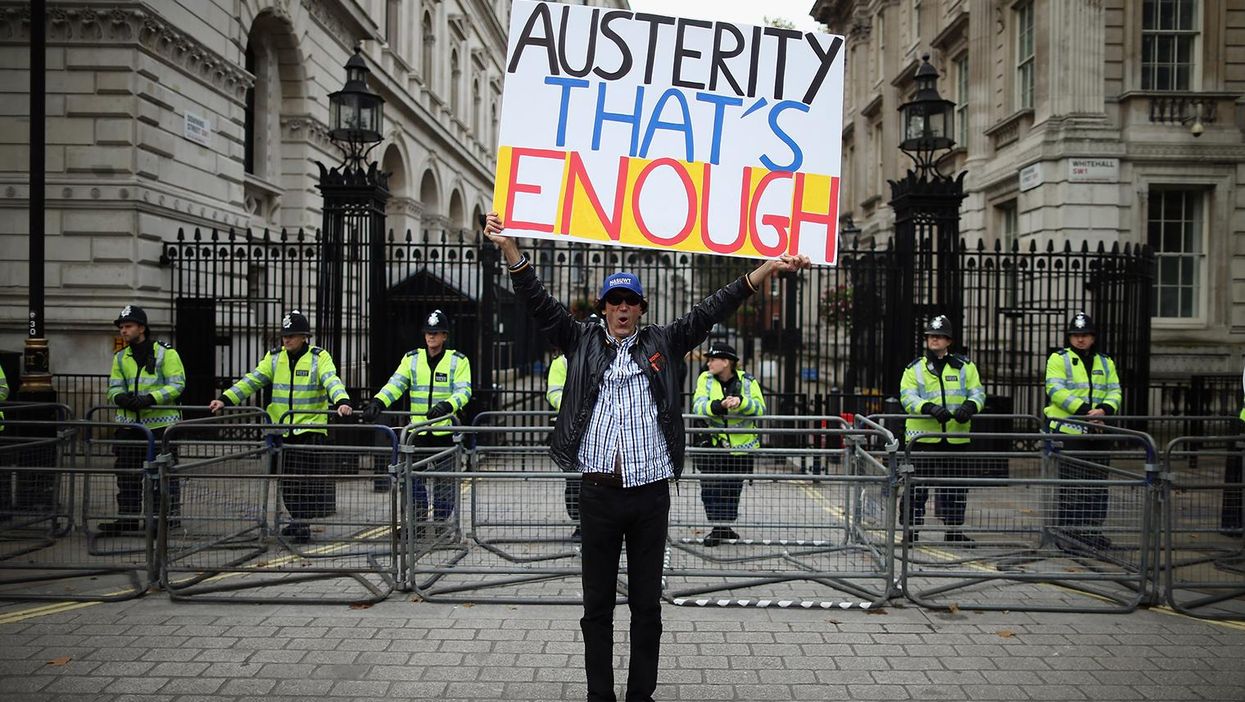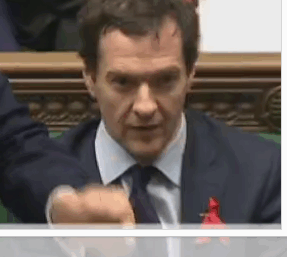News
Loulla-Mae Eleftheriou-Smith
Jun 20, 2015

Tens of thousands of people are today expected to take part in the End Austerity Now march in London.
The People's Assembly, which is organising the protests against government cuts, said the rally would be the start of a campaign of "strikes, direct action and civil disobedience" across the UK.
We will not rest until austerity is history, our services are back in public hands and the needs of the majority are put first.
- Sam Fairbairn of the People's Assembly
Last year, the Office for Budget responsibility revealed that only 40 per cent of the cuts planned by George Osborne had been made under the coalition - effectively meaning the remaining 60 per cent would be made in this parliament by 2020.
In other words, the worst is yet to come.
With that in mind, here's what has already been cut by the last government:
Police
More than 1,000 police community support officer (PCSO) jobs have been cut in England each year since 2010, a total of 4,430 positions, according to Home Office statistics analysed by Unison. PCSOs make up 75 per cent of neighbourhood policing teams. The BBC reports the number of police officers currently employed across England and Wales is 127,000 – the lowest since September 2001.
Firefighters
By 2011 more than 1,000 jobs had been cut across England, Scotland and Wales according to the Fire Brigades Union. By 2014, 10 firestations in London alone were forced to close, causing 552 jobs to be lost, as part of £45m worth of savings needed to be made across the capital’s service by 2016.
Disabled people
Under the last government, the Independent Living Fund, which provided £320m worth of financial support to around 18,000 disabled people, was abolished. The fund was set up to allow disabled people live in their communities rather than residential care.
NHS spending
In 2012, the Independent on Sunday reported Labour analysis of Treasury figures showed NHS spending was found to have been cut by £800m in real terms by analysing Treasury figures. The numbers showed that NHS spending in 2009/10 had been £99.8bn, in 2010/11 it was £102bn, and in 2011/12 £104.3bn. When inflation had been taken into account and the numbers based on 2011/12 prices, NHS spending had actually fallen from £105.1bn in 2009/10; £104.4bn in 2010/11 – a fall of 0.6 per cent; and £104.3bn in 2011/12, a further fall of 0.1 per cent.
NHS children’s mental health services
NHS spending on children’s mental health services in England has dropped by nearly £50m between 2009/10 and 2013/14 – the latest year figures are available for. The figures were revealed through a parliamentary answer, showing that in the last year of the previous Labour government spending had been at £766m in terms of 2013/14 prices. The figures showed that under the Coalition this had dropped to £717m in 2013/14.
NHS mental health trusts funding
Funding for mental health trusts and the services they provide have been eight per cent in real terms since 2010, equating to nearly £600m after inflation had been accounted for, an investigation by Community Care and BBC News discovered. During this period the community mental health teams, which aim to stop people’s mental health passing a “crisis point”, have seen their referrals rise by 20 per cent.
Child benefit
Child benefit, once available to all parents, is no longer available in full for families where one parent earns more than £50,000 per year.
Social care
A million elderly people aged between 65 and 89 who need help with basic tasks like washing, dressing and climbing the stairs have been left to fend for themselves due to cuts to local-government funded social care over the past five years according to Age UK. The charity says this puts more pressure on the NHS.
The Health and Social Care Information Centre found that eight per cent of the adult social care workforce at local councils, equating to 10,600 jobs, were cut in the 2013/14 year alone as part of 40 per cent cuts to local council budgets.
Legal Aid
Changes to Legal Aid as part of plans to reform the system and save £350m a year came into effect in 2013 across England and Wales, meaning certain types of cases are now no longer eligible for public funding, including divorce, child contact, residence disputes, welfare benefits, employment, clinical negligence. It has led to an increase in people being forced to represent themselves in court, while the Justice Committee in March found the Ministry of Justice has failed to give legal aid to those who needed it most and to have not delivered value for money to the taxpayer.
Domestic violence
Cuts in funding to services for victims of domestic violence have seen 112 specialist posts cut in 2013 alone. On a “snapshot day” on 27 June 2013, 155 women and 103 children were forced to be turned away from the first refuge they approached, Women’s Aid found.
Housing benefit
The ‘bedroom tax’ has seen the amount of rent people can claim housing benefit for reduced by 14 per cent if a person lives in a council property with one spare room, and 25 per cent if there are two or more spare rooms.
Benefit cap
In 2013 the Government capped the total amount of benefits that working age people could claim in a single week, regardless of whether they are entitled to a higher amount of benefits or not, with an estimated 50,000 households thought to be losing an average of £93 per week.
Did we miss anything big? Let us know in the comments
More: George Osborne still doesn't like it when you mention spending cuts
Top 100
The Conversation (0)














